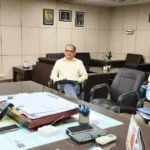Gurugram's Bulk Waste Management: Strict Enforcement of Rules Ahead
Gurugram Municipal Corporation Takes Action on Bulk Waste Generators

In a recent review meeting led by Dr. Balpreet Singh, the Additional Commissioner of Gurugram Municipal Corporation, significant steps were outlined to enhance the monitoring of bulk waste generators (BWGs) in the city. The online registration process for BWGs is nearing completion, and those failing to manage waste properly will face penalties.
The meeting revealed that 2,544 BWGs have already registered on the online portal. The monitoring team is actively inspecting these generators and is close to finalizing the advisory process.
Dr. Singh emphasized the need for inspectors to conduct regular checks and initiate effective enforcement campaigns, particularly in the last week of each month. He stressed the importance of adhering to the Solid Waste Management Rules of 2016, warning that violators will be penalized. Each inspection team is expected to evaluate at least six sites daily, ensuring fair and unbiased actions.
Furthermore, Dr. Singh clarified that all BWGs are required to manage their waste on-site, categorizing it into wet, dry, and hazardous waste. Wet waste can be converted into compost or biogas, while dry and hazardous waste should be disposed of through designated recycling channels. He reiterated that waste from BWGs should not leave their premises, except for inert materials sent to secondary collection points.
